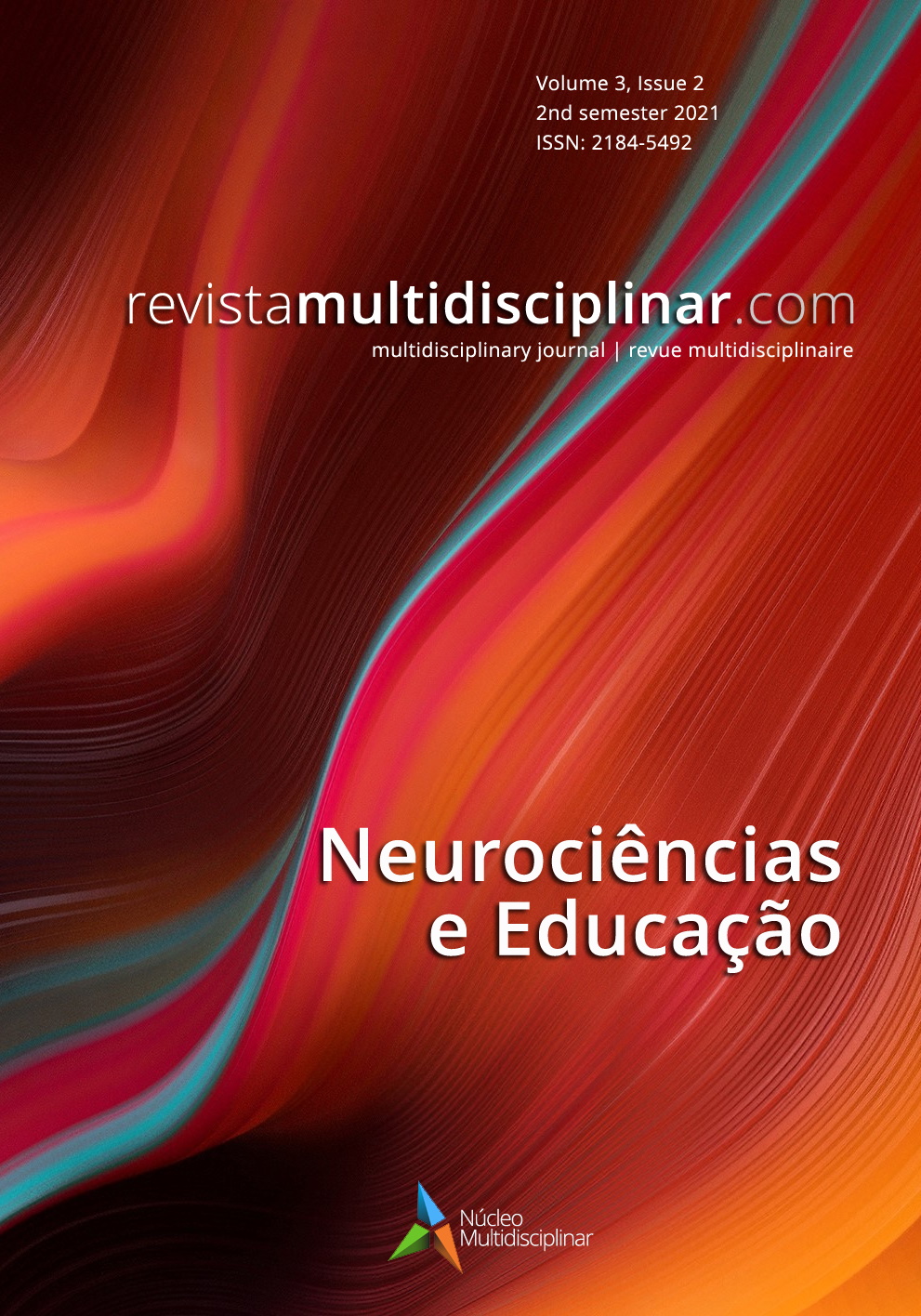As bases neuronais da memória e da aprendizagem
Conhecer para atuar
DOI:
https://doi.org/10.23882/NE2148Palavras-chave:
aprendizagem, educação, memória, neurociênciasResumo
As neurociências são uma emergente área do conhecimento científico, cujo objetivo é contribuir para o conhecimento do cérebro. Devido à complexidade do objeto de estudo, é um domínio eminentemente interdisciplinar, integrando áreas científicas diversas, como a biologia, a química, a medicina ou a psicologia. Este trabalho resulta de revisão bibliográfica subordinada ao tema das neurociências e das bases neurológicas subjacentes aos processos cognitivos, abordando os processos envolvidos na construção da memória, da aprendizagem ou da atenção. Apresenta ainda possíveis pontes entre as neurociências e a educação e as neurociências e a inteligência artificial.
Referências
Ansari, D., & Coch, D. (2006). Bridges over troubled waters: Education and cognitive neuroscience. Trends in cognitive sciences, 10(4), 146-151.
Asok, A., Leroy, F., Rayman, J. B., & Kandel, E. R. (2019). Molecular mechanisms of the memory trace. Trends in neurosciences, 42(1), 14-22.
Basar, E. (2004). Memory and brain dynamics: Oscillations integrating attention, perception, learning, and memory. CRC press.
Bauer, P. J., Dugan, J. A., Varga, N. L., & Riggins, T. (2019). Relations between neural structures and children’s self-derivation of new knowledge through memory integration. Developmental cognitive neuroscience, 36, 100611.
Bear, M., Connors, B., & Paradiso, M. A. (2020). Neuroscience: Exploring the brain. Jones & Bartlett Learning, LLC.
Byrne, J. H. (2017). Learning and memory: a comprehensive reference. Academic Press.
Calafate, L., & Mateus-Pinheiro, A. (2019). Neurogénese em mamíferos adultos-história de uma descoberta revolucionária e sua exploração no ensino das neurociências. In 1. º Congresso Internacional de História da Ciência no Ensino. Universidade do Porto.
Castro-Caldas, A. (2008). Viagem ao Cérebro e a algumas das suas competências. Lisboa: Universidade Católica Editora.
Deng, W., Aimone, J. B., & Gage, F. H. (2010). New neurons and new memories: how does adult hippocampal neurogenesis affect learning and memory?. Nature reviews neuroscience, 11(5), 339-350.
Fischer, K. W. (2009). Mind, brain, and education: building a scientific groundwork for learning and teaching1. Mind, Brain, and Education, 3(1), 3-16.
Gonçalves, L. A., & de Melo, S. R. (2009). A base biológica da atenção. Arquivos de Ciências da Saúde da Unipar, 13(1).
Hassabis, D., Kumaran, D., Summerfield, C., & Botvinick, M. (2017). Neuroscience-inspired artificial intelligence. Neuron, 95(2), 245-258.
Kandel, E. R. (2001). The molecular biology of memory storage: a dialogue between genes and synapses. Science, 294(5544), 1030-1038.
Kandel, E. R. (2007). In search of memory: The emergence of a new science of mind. WW Norton & Company.
Karpicke, J. D. (2017). Retrieval-Based Learning: A Decade of Progress. In Byrne J. H. (Ed.) Learning and Memory: A Comprehensive Reference (pp.487-514). Academic Press.
Karpicke, J. D., & Blunt, J. R. (2011). Retrieval practice produces more learning than elaborative studying with concept mapping. Science, 331(6018), 772-775.
Karpicke, J. D., & Roediger, H. L. (2008). The critical importance of retrieval for learning. Sciense, 319(5865), 966-968.
Posner, M. I., & Rothbart, M. K. (2014). Attention to learning of school subjects. Trends in Neuroscience and Education, 3(1), 14-17.
Posner, M. I., Rothbart, M. K., & Voelker, P. (2016). Developing brain networks of attention. Current opinion in pediatrics, 28(6), 720.
Rato, J. R., Abreu, A. M., & Castro-Caldas, A. (2013). Neuromyths in education: What is fact and what is fiction for Portuguese teachers?. Educational Research, 55(4), 441-453.
Schlichting, M. L., & Preston, A. R. (2015). Memory integration: neural mechanisms and implications for behavior. Current opinion in behavioral sciences, 1, 1-8.
Schlichting, M. L., & Preston, A. R. (2016). Hippocampal–medial prefrontal circuit supports memory updating during learning and post-encoding rest. Neurobiology of learning and memory, 134, 91-106.
Summak, M. S., Summak, A. E. G., & Summak, P. Ş. (2010). Building the connection between mind, brain and educational practice; roadblocks and some prospects. Procedia-Social and Behavioral Sciences, 2(2), 1644-1647.
Tokuhama-Espinosa, T. (2010). Mind, brain, and education science: A comprehensive guide to the new brain-based teaching. WW Norton & Company.
Ullman, S. (2019). Using neuroscience to develop artificial intelligence. Science, 363(6428), 692-693.
Van Kesteren, M. T., Ruiter, D. J., Fernández, G., & Henson, R. N. (2012). How schema and novelty augment memory formation. Trends in neurosciences, 35(4), 211-219.
Downloads
Publicado
Como Citar
Edição
Secção
Licença
Direitos de Autor (c) 2021 Marta Paz, Luís Calafate

Este trabalho encontra-se publicado com a Creative Commons Atribuição-NãoComercial 4.0.









